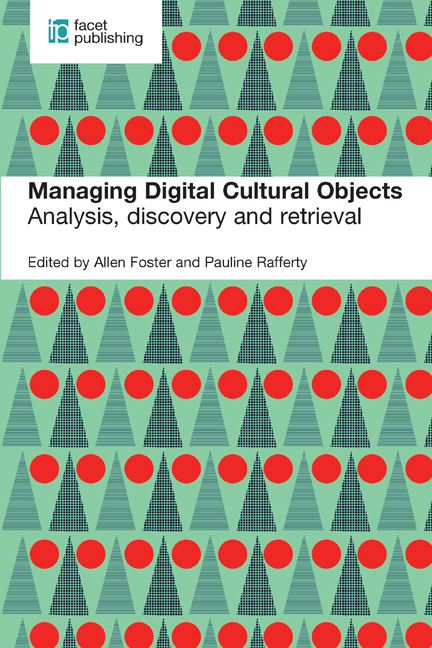Book contents
- Frontmatter
- Contents
- List of figures and tables
- Contributors
- Introduction
- PART 1 ANALYSIS AND RETRIEVAL OF DIGITAL CULTURAL OBJECTS
- 1 Managing, searching and finding digital cultural objects: putting it in context
- 2 Data modelling for analysis, discovery and retrieval
- 3 The digital traces of user-generated content: how social media data may become the historical sources of the future
- PART 2 DIGITIZATION PROJECTS IN LIBRARIES, ARCHIVES AND MUSEUMS: CASE STUDIES
- PART 3 SOCIAL NETWORKING AND DIGITAL CULTURAL OBJECTS
- Index
1 - Managing, searching and finding digital cultural objects: putting it in context
from PART 1 - ANALYSIS AND RETRIEVAL OF DIGITAL CULTURAL OBJECTS
Published online by Cambridge University Press: 09 June 2018
- Frontmatter
- Contents
- List of figures and tables
- Contributors
- Introduction
- PART 1 ANALYSIS AND RETRIEVAL OF DIGITAL CULTURAL OBJECTS
- 1 Managing, searching and finding digital cultural objects: putting it in context
- 2 Data modelling for analysis, discovery and retrieval
- 3 The digital traces of user-generated content: how social media data may become the historical sources of the future
- PART 2 DIGITIZATION PROJECTS IN LIBRARIES, ARCHIVES AND MUSEUMS: CASE STUDIES
- PART 3 SOCIAL NETWORKING AND DIGITAL CULTURAL OBJECTS
- Index
Summary
Introduction
The challenges of managing digital cultural objects have been considered by many academics in the fields of information sciences, archives, media and communications and computer sciences, to name but a few stakeholder disciplines (see for example Besser, 1997; Minzter, 1999; Gilliland-Swetland, 2000; Srinivasan et al., 2009; Beaudoin, 2012; Christodoulakis, 2014). Challenges are not only technical but often related to the semantic and communicative aspects of cultural objects. This introductory chapter seeks to contextualize the major themes relating to managing, searching, and finding digital cultural objects which are explored in this book by considering some of the broader issues relating to communication and practice. It explores the retrieval of digital cultural documentation with reference to communication and cultural theory, specifically social semiotics, and it will also explore semantic approaches to indexing and approaches which go beyond the conventional, such as emotional indexing and storytelling as indexing, before moving on to consider aspects of digital cultural collections, particularly crowdsourcing in conventional cultural memory insti - tutions and amateur collections. That cultural documentation brings with it certain semantic and interpretative challenges has long been recognized in the literature (see for example, Langridge's 1989 book on subject analysis, which examines questions relating to interpretation and meaning and remains a classic in the field, and Rafferty and Hidderley's 2005 Indexing Multimedia and Creative Works, which includes some theoretical discussion relating to the problems of interpretation of nontextual information). Kim Veltman (2006) outlines the challenges of developing an information retrieval and knowledge organization framework for representing and facilitating access to digital cultural documentation in the context of the semantic web. Veltman was writing at a time when the development of the putative semantic web was beginning to be discussed, and the scholarly literature surrounding the semantic web suggested that knowledge organization systems such as ontologies and taxonomies would be crucial to facilitating the development of the semantic web (see, for example, Weller, 2010 and Morville, 2005). Many of the issues that Veltman raised in that paper are still useful in forming a framework through which to examine digital cultural information retrieval systems.
- Type
- Chapter
- Information
- Managing Digital Cultural ObjectsAnalysis, discovery and retrieval, pp. 3 - 24Publisher: FacetPrint publication year: 2016



